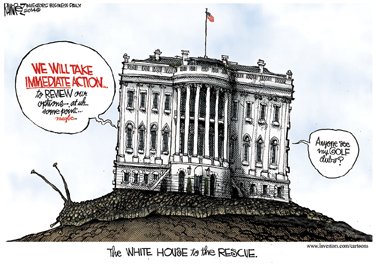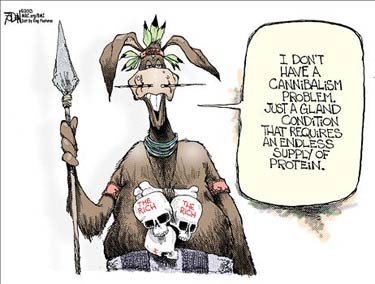Category Archive 'Walter Russell Mead'
19 Jan 2016


Old Hickory
Walter Russell Mead warns that a spectre is haunting the election of 2016, the spectre is that of no less than Andrew By God! Jackson, and the Locofocos are again challenging the rule of the Bank and the Urban Elites.
Not since he fought with Nicholas Biddle over the future of the Bank of the United States has Andrew Jackson been this controversial or this central in American political life. Jacksonian populism, the sense of honor-driven egalitarianism and fiery nationalism that drove American politics for many years, has never been hated and reviled as often as it is today, and many American academics and intellectuals (to say nothing of Hollywood icons) are close to demanding that Jacksonian sentiment be redefined as a hate crime.
For President Barack Obama and his political allies in particular, Jacksonian America is the father of all evils. Jacksonians are who the then Senator had in mind when, in the campaign of 2008, he spoke of the ‘bitter clingers’ holding on to their guns and their Bibles. They are the source of the foreign policy instincts he most deplores, supporting Israel almost reflexively, demanding overwhelming response to terror attacks, agitating for tight immigration controls, resisting diplomacy with Iran and North Korea, supporting Guantanamo, cynical about the UN, skeptical of climate change, and willing to use ‘enhanced interrogation’ against terrorists in arms against the United States. …
The hate and the disdain don’t spring from anything as trivial as pique. Historically, Jacksonian America has been the enemy of many of what President Obama, rightly, sees as some of America’s most important advances. …
Virtually everything about progressive politics today is about liquidating the Jacksonian influence in American life. From immigration policy, touted as ending the era when American whites were the population of the United States, to gun policy and to regulatory policy, President Obama and his coalition aim to crush what Jacksonians love, empower what they fear, and exalt what they hate. …
What we are seeing in American politics today is a Jacksonian surge. …
Donald Trump, for now, is serving as a kind of blank screen on which Jacksonians project their hopes. Proposing himself as a strong leader who ‘gets’ America but is above party, Trump appeals to Jacksonian ideas about leadership. Trump’s Jacksonian appeal has left the Republican Party in deep disarray, demonstrating the gulf between contemporary conservative ideology and Jacksonian nationalism. Indeed, one of the reasons that Trump hasn’t been hurt by attacks that highlight his lack of long term commitment to the boilerplate conservative agenda (either in the social or economic conservative variant) is that Jacksonian voters are less dogmatic and less conservative than some of their would-be political representatives care to acknowledge. …
Whatever happens to the Trump candidacy, it now seems clear that Jacksonian America is rousing itself to fight for its identity, its culture and its primacy in a country that it believes it should own. Its cultural values have been traduced, its economic interests disregarded, and its future as the center of gravity of American political life is under attack. Overseas, it sees traditional rivals like Russia, China, North Korea and Iran making headway against a President that it distrusts; more troubling still, in ISIS and jihadi terror it sees the rapid spread of a movement aiming at the mass murder of Americans. Jacksonian America has lost all confidence in the will or the ability of the political establishment to fight the threats it sees abroad and at home. It wants what it has always wanted: to take its future into its own hands.
The biggest story in American politics today is this: Andrew Jackson is mad as hell, and he’s not going to take it anymore.
Read the whole thing.
Hat tip to Bird Dog.
24 Nov 2014


Walter Russell Mead has intelligent things to say about immigration and American history and predicts that Barack Obama’s shameless ploy to capture Hispanics as a permanent democrat constituency is based on flawed and grossly oversimplified thinking. All this, he contends, is going to backfire on democrats and Barack Obama is carving out a place for himself in presidential history below Jimmy Carter’s.
President Obama’s new initiative is unlikely to succeed politically—in part because Democrats are overconfident that rising Hispanic immigration will deliver them a permanent, left-leaning majority.
Frank Fukuyama, no howling partisan, has tagged President Obama’s decision to circumvent Congress on immigration as a “bad call,†and while the President’s limited offer of a three-year temporary work authorization for people in the country illegally was not the worst or the most radical step he could have taken, Frank is right. This was the wrong step at the wrong time. At the very minimum, the President should have given the new Congress ninety days to act before going it alone. Failing to do so isn’t just a slap in the face of his Republican opponents; it is a slap in the face of the voters who no longer trust the President and his party on the big issues of national life.
If the new Congress proved unable or unwilling to act, the President’s step would have had at least an element of political legitimacy to it. As it is, this half-hearted, hobbled amnesty will likely join President Obama’s flawed health care law as a toxic legacy that will haunt the Democratic Party for years to come. Just as the President’s poor reputation was a millstone around the neck of many Democratic candidates in 2014, future Democratic candidates are going to run away from Obama’s memory, and their opponents will work to tag them with the heavy burden of a presidency that most Americans will want to forget. As a political brand, the name “Barack Obama†now risks drifting into Jimmy Carter territory and becoming a label that blights the prospects of the Democratic party and its candidates for years.
Moreover, as with the health care law, the President’s immigration policy doesn’t solve the underlying problems it addresses and makes the task of real reform more difficult.
25 Jun 2014


Walter Russell Mead delivers, what Andrew Sullivan calls, “a majestically sweeping indictment of everything [P]resident Obama has achieved in foreign policy over the last six years.”
One wishes we had a Republican President right now if only because when a Republican is in the White House, the media and the chattering classes believe they have a solemn moral duty to categorize and analyze the failures of American strategy and policy. Today that is far from the case; few in the mainstream press seem interested in tracing the full and ugly course of the six years of continual failure that dog the footsteps of the hapless Obama team in a region the White House claimed to understand. Nothing important has gone right for the small and tightly knit team that runs American Middle East policy. Most administrations have one failure in Israeli-Palestinian peacemaking; this administration has two, both distinctly more ignominious and damaging than average. The opening to the Middle East, once heralded by this administration as transformative, has long vanished; no one even talks about the President’s speeches in Cairo and Istanbul anymore, unless regional cynics are looking for punch lines for bitter jokes. The support for the “transition to democracy†in Egypt ended on as humiliating a note as the “red line†kerfuffle in Syria. The spectacular example of advancing human rights by leading from behind in Libya led to an unmitigated disaster from which not only Libya but much of north and west Africa still suffers today.
Rarely has an administration so trumpeted its superior wisdom and strategic smarts; rarely has any American administration experienced so much ignominious failure, or had its ignorance and miscalculation so brutally exposed. No one, ever, will call this administration’s Middle East policies to date either competent or wise—though the usual press acolytes will continue to do what they can to spread a forgiving haze over the strategic collapse of everything this White House has attempted, as they talk about George W. Bush at every chance they get.
Now, from the ruins of the Obama Administration’s Middle East strategy, the most powerful and dangerous group of religious fanatics in modern history has emerged in the heart of the Middle East. The rise of ISIS is a strategic defeat of the first magnitude for the United States and its allies (as well as countries like Russia and even China). It is a perfect storm of bad policy intersecting with troubled times to create the gravest threat to U.S. and world stability since the end of the Cold War.
The mainstream press and the professional chatterboxes of the news shows need to set aside their squeamishness at poring over the details of a major strategic failure by a liberal Democrat. The rise of ISIS/ISIL is a disaster that must be examined and understood. How could the U.S. government have been caught napping by the rise of a new and hostile power in a region of vital concern? What warning signs were missed, what opportunities were lost—and why? What role did the administration’s trademark dithering and hairsplitting over aid to ISIS’s rivals in the Syrian opposition play in the rise of the radicals?
Read the whole thing.
25 Jan 2013


Walter Russell Mead describes the democrat elite’s vision of the future: a massive system of redistributionism devoted to trickling down condescending alms to a nation of losers from a tiny meritocratic New Class elite which rules over all.
A conventional, widely shared view informs the way that blue America looks at that future. This view holds that the death of industrial society means the death of the mass middle class. When millions of people can’t make a living “making stuff†in factories anymore, wages for the unskilled will fall. America will be increasingly polarized between a small group of high skilled creative professionals and a larger group scavenging a living by serving them: mowing their lawns, catering their parties and so on.
Those who think that the blue model needs to be preserved and extended into the future (including, I think, our current president and most of his top allies and advisors), tend to think that under those conditions we will both need and be able to afford an ever-more active redistributive state. The tycoons and the very successful minority will be so rich, thanks to their continuing gains from globalization and technological change, that they can pay progressively higher taxes to fund basic services and middle class jobs for enough of the rest of the country that something like a middle class society can be preserved. From this perspective, a government-funded health care system is more than a method of delivering health care: it is a way of providing protected, blue-model type jobs when the factories have mostly disappeared.
Read the whole thing.
04 Jul 2012


Walter Russell Mead imagines the Declaration of Independence as revised by today’s American community of fashion.
The unanimous Declaration of the Thirteen Post-Colonial, Multi-Racial Societes of North America
When in the Course of human events, it becomes necessary for one people to strengthen the political bands which have connected them with the Global Community, and to assume among the powers of the earth, the cooperative and deferential station which a careful review of the relevant peer reviewed literature suggests is most appropriate for long term win-win outcomes, a decent and rigorously equal respect to the opinions of woman- and man- and transkind requires that they should declare the causes which impel them to the ever deeper union.
We hold these views to be consistent with the evolving cultural consensus, that all humans are equally obliged to the performance of certain Duties, that among these are the Participation in the Struggle against Racism, Economic Injustice, Genetically Modified Organisms, Homophobia, Nationalism and the Excessive Emission of Carbon Dioxide and Other Greenhouse Gasses. That to secure the performance of these Duties, Governments are instituted among humans, deriving their just powers from the considered Opinions of the Educated Classes.
Read the whole thing.
30 Jan 2012


John Gast, American Progress (and other titles), 1872, most frequently seen in chromolithograph form inside cigar boxes.
Walter Russell Mead starts a new insightful essay which argues that the Progressive, Blue State-politics ideas revolving around suburbia, a manufacturing economy, a constantly-expanding regulatory regime and welfare state pertain to rapidly vanishing world, destined to follow the Indians and the buffalo, and the family farm and homestead into America’s past.
The frustration and bitterness that fills American politics these days reflects the failure of our current social, political and economic institutions and practices to deliver the results that Americans want and expect. It’s comparable to the frustration and fear that swept through the country in the late 19th and early 20th century as the first American dream – that every family could prosper on its own farm – gradually died….
Our political battles today reflect the same kinds of frustrations we saw in the old populist era. Many cannot fathom another and “higher†form of the American Dream beyond the old crabgrass utopia. They want to turn back the clock and restore the old system because they don’t know of anything else that will work. …
It is, of course, a very similar situation today. The forces ripping up our old social model are too powerful to beat. That is not because the rich bankers or global multinationals are engaged in a conscious conspiracy of rip-offs and oppression (though, frankly speaking, big business does sometimes engage in exactly that). It is because the forces ripping up the social model are deeply implanted in the nature of the economic system — and that system is a reflection of the propensities in human nature which we cannot and perhaps should not overcome.
There is another important similarity, one often overlooked in the pessimism, anger and anxiety provoked by the inexorable decline of the “blue social model†that shaped America in the 20th century — just as it was overlooked 100 years ago.
Read the whole thing.
13 Jun 2011

Walter Russell Mead mixes his Animal kingdom metaphors, but nonetheless delivers another important essay, arguing (from a position sympathetic to Progressivism) that the Progressive political movement has passed through a natural life cycle into the final stage in which it has become sclerotic and destructive.
..Fannie Mae represents a special problem for the Democratic Party and Democratic ideas. It is not just a vitally important institution led by prominent Democratic figures and part of a broader Democratic patronage network; Fannie Mae is one of the original New Deal institutions and the vision it was intended to serve stands at the heart of the concerns of the Democratic Party of the 20th century.
The fall of Fannie Mae is bigger than just another politicos run wild scandal. It stands as one of several signs that our current way of life is reaching its limits and that big changes are on the horizon. The Fanniegate debacle tells us that the progressive ideal is in the process of jumping the shark.
Jumping the shark, as many readers know, is an expression from the wonderful world of TV. When the original premise of a show has gone stale, producers try to recapture audience interest by putting familiar characters in outlandish settings where strange things happen to them — notoriously, when Fonzie literally jumped over a shark as Happy Days moved into its sunset years. When something jumps the shark, the death spiral has become irretrievable; the show has nowhere to go but down.
The progressive ideal of the last 100 years is reaching that point. In its day the progressive ideal was a revolutionary and even a noble one. A bureaucratic and professional elite would mediate social conflict between rich and poor, improving the lives of the poor while engineering the best possible administrative solutions to pressing social problems. Keynesian macroeconomic management would ensure lasting prosperity; progressive taxation would spread the benefits of prosperity as widely as possible. Levels of education would rise as more and more Americans spent more and more years in school.
Progressivism held out the hope that capitalism, democracy and history itself could all be tamed by competent professional management. Victorian capitalism had been brutal, disruptive, competitive. Society became more unequal even as living standards gradually rose. Democracy was irresistible, but the masses were uneducated. The modern progressive era was born at times of great violence and upheaval. World War One, the Russian Revolution, the Great Depression, the rise of fascism, World War Two, the invention of nuclear weapons and the start of the Cold War: it was against this background that progressives sought to turn modern life into something safe and tame.
I cannot blame four generations of progressive intellectuals for trying to make life a little less brutal and unpredictable, nor should we overlook the successes they had. Nevertheless, the Fonz has left the building; the progressive paradigm today can no longer serve as the basis for sound national policy. …
The problem today is that we are looking not just at one or two government programs that have succumbed to elephantiasis or turned into sharks; the progressive complex of social and economic policy as a whole has reached this point. Today many of our New Deal and Great Society programs are either elephants or sharks. They either lead us to misallocate scarce resources in ineffective ways or they threaten us with ruin by becoming politically untouchable budget busters.
Progressivism itself, and not simply the individual government programs it spawns, is moving through the same cycle of life. The most urgent social problems that progressivism set out to solve have been dealt with. Child labor and lynch mobs are no longer common in the United States. The greatest natural and scenic treasures of the country are protected by the National Park system. Food is much less dangerous, buildings are better built, cars are safer, the air and water is in better shape and the charismatic megafauna (big interesting animals) have been saved from extinction. Many more people have much more access to education today than was true 100 years ago; ditto for lifesaving medical treatment.
The progressive vision morphed from Great White Hope and Great White Father into Great White Elephant over the years. Early progressives picked the low-hanging fruit; they addressed the most important problems that were most susceptible to progressive interventions. Increasingly they are left with more expensive, less effective approaches to big problems (like Obamacare) or the agenda moves from issues of great moral and political significance like equal rights for African-Americans to less consequential issues like wider social acceptance of the transgendered. To raise the percentage of young Americans attending college from 2 percent to 20 percent is a significant achievement; to extend it from 40 percent to 60 percent will likely cost much more and accomplish much less in terms of raising social productivity.
We now see the progressive agenda dealing with issues like high speed rail, where the gains are so small and the rationale are so weak from the beginning that the program is a white elephant before it is fully set up.
The fierce commitment of progressive lobbies today to dysfunctional institutions and programs has brought matters to a crisis stage; the progressive legacy is morphing from white elephant to shark. Fierce attacks on anyone seeking to reform dysfunctional institutions combine with unreasoning devotion to unsustainable entitlements. “Progressives†today are too often grimly determined to achieve two incompatible ends: an indefinite expansion of entitlements and benefits on the one hand — and the preservation and even the extension of inefficient organizations and methods on the other.
Read the whole thing.
Your are browsing
the Archives of Never Yet Melted in the 'Walter Russell Mead' Category.
/div>

Feeds
|









